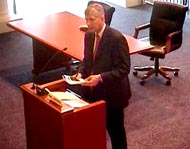5/23/2008
Iowa Supreme Court to Rule on Photo Ticket LegalityIowa Supreme Court justices are debating the merits and legality of photo enforcement.

The Supreme Court of Iowa is preparing to rule on a case that could require cities to refund every speed camera and red light camera ticket issued in the state. Late last month, the high court heard a second round of arguments, this time from lawyers on both sides of the case involving Illinois resident Monique D. Rhoden. In January, 2007, a Scott County court threw out the speed camera ticket issued to Rhoden because the municipality lacked authority to convert a criminal offense, speeding, into a civil fine (view ruling).
"You're really talking about two consistent, complementary systems," Davenport city attorney Craig A. Levien said in defending the cameras. "-- the state motor vehicle code, which is enforced against drivers for criminal prosecution, and the ordinance which is against owners and is a civil violation.... What this ordinance does is supplement and complement the method to enforce this uniform conduct."
Levien argued that the city's automated ticketing program is entirely consistent with state law because it penalizes the same conduct as state law, just through different methods. This argument played well with the court's chief justice, who championed photo enforcement.
"Isn't the conduct that's prohibited the same?" Chief Justice Marsha K. Ternus asked. "Whoever's driving your car is not supposed to run a red light or speed... You [can't] assume that in the absence of the cameras that all these same speeders and violators would be caught. That's the whole reason for these cameras. You can't have a cop on every corner."
The motorists' attorney, Thomas D. Waterman, countered that the conduct being punished by Davenport is ownership of a vehicle because tickets are sent to car owners, not the driver responsible for the violation. Waterman cited the neighboring state of Minnesota's supreme court decision (view ruling) in support of his contention that allowing each municipality to apply civil punishment for a criminal conduct under state law would render meaningless the requirement that traffic laws throughout the state be uniform. The distinction between civil and criminal, he argued, makes no difference to the motorist.
"Dollars are dollars," Waterman said.
Waterman's argument resonated with Justice Brent R. Appel who pointed out that under Davenport's photo enforcement scheme, a police officer waiting at a red light camera intersection could issue a speeding ticket to a driver under the state code. Then, a speed camera ticket could be mailed to the owner, effectively doubling the punishment and exceeding the maximum penalty allowed under state law.
"Aren't you punishing these people twice?" Justice Appel asked Davenport's attorney. "Regardless of what the label is. For the person getting the paperwork, getting the write-up, opening the mail, paying the bills -- there's not much difference. Really, you're kinda playing games with the characterization, civil or criminal. You're really coming at the same problem in a way that's inconsistent."
The final decision of the justices is expected later this year.


